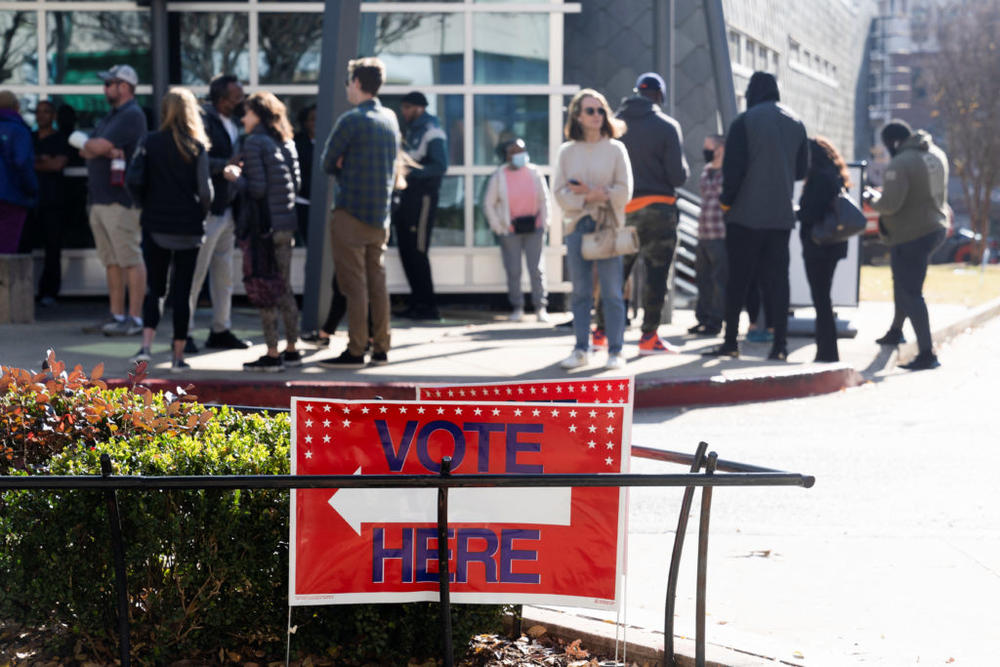
Section Branding
Header Content
Georgia Today: DUI kills NWGA mayor, spike in flu and RSV, diversity in the Capitol
Primary Content
LISTEN: On the Monday Dec. 12 edition of Georgia Today: DUI kills an Northwest Georgia mayor, there's a spike in flu and RSV, and growing diversity in the Capitol.

TRANSCRIPT:
Peter Biello: Welcome to the new Georgia Today podcast from GPB News. Today is Monday, December 12th. I'm Peter Biello. Coming up on today's episode, the mayor of a northwest Georgia City and his wife were killed in a DUI accident over the weekend. Experts warn that winter could bring a spike in flu, RSV and COVID-19 cases. And Georgia's upcoming legislative session will feature an increasingly diverse group of lawmakers. These stories and more are coming up on Georgia Today.

Story 1
Peter Biello: Opponents of a planned $5 billion Rivian electric vehicle plant east of Atlanta have dropped their lawsuit to stop the project. Rivian opponents last week dropped a lawsuit against the project after a judge allowed excavation work at the site to continue. But another lawsuit questions the project's financing. State and local officials have appealed a judge's ruling denying Rivian a lucrative incentive package that lured the automaker to Georgia. Attorney John Christy represents several of the opponents.
John Christy: Whatever happens with the decision, the Court of Appeals, it will undoubtedly be appealed by somebody to the Supreme Court. So ultimately, I think that the issue in the bond validation will wind up in the Supreme Court. So all I can say is stay tuned.
Peter Biello: State officials say the project and the expected 7,000 jobs that come with it will transform the regional economy. Opponents stress potential strains on the area's infrastructure, natural resources and quality of life as they seek to stop it.
Story 2
Peter Biello: Respiratory viruses are continuing to send adults and children to the ER this flu season. GPB's Ellen Eldridge reports on the early spike in cases.
Ellen Eldridge:Experts warned winter could bring a spike in flu, RSV and COVID-19 cases — and that is coming to fruition. Respiratory illness rates are high and continue to overwhelm hospitals. Dr. Mitch Rodriguez is with the Beverly Neilsen Children's Hospital in Macon. He says viruses are not treated with antibiotics. That means not everyone needs to go to the hospital.
Dr. Mitch Rodriguez: But those who have co-morbidities are those that are very, very young are at risk for hospitalization related to the flu or RSV. And that becomes one of the bigger concern that we have is essentially finding pediatric intensive care beds in the state.
Ellen Eldridge: He says anyone with trouble breathing or severe dehydration should head to an emergency room. For GPB News, I'm Ellen Eldridge.
Story 3
Peter Biello: Officials say a car crash killed the longtime mayor of Emerson, Georgia and his wife over the weekend. The Cherokee County Sheriff's Office said Albert and Camilla Pullen died Saturday afternoon when the driver of a pickup lost control and swerved into oncoming traffic, hitting the couple's SUV. The sheriff's office says the driver of the pickup was charged with driving under the influence. Pelosi served as mayor of Emerson, a city of about 1,400 people in neighboring Bartow County for 15 years.
Story 4
Peter Biello: Georgia's upcoming legislative session will feature an increasingly diverse group of lawmakers. Nonwhite members of the General Assembly are banding together to bolster their political power. GPB's Riley Bunch has the story.
Riley Bunch:The tragic shooting spree across three Atlanta area spas in 2021 put a spotlight on Georgia's Asian community. At the time, AAPI members of the legislature raised their voices and advocated for legislative change. Now, with an even larger coalition under the Gold Dome, they are forming a bipartisan caucus aimed at addressing more needs of their growing population.
Michelle Au: We countered that regardless of how the election shook out, we were going to have a historic number of Asian legislators representing and pretty importantly, I think, representing on both sides of the aisle.
Riley Bunch: That's Democratic State Sen. Michelle Au. She says that the increase of AAPI legislators and the diversity of their backgrounds is emblematic of Georgia's changing electorate. Asian community organizations are also hoping the new caucus will support their policy priorities. Aisha Yaqoob Mahmood is the executive director of the Asian-American Advocacy Fund. She wants lawmakers to make good on promises they made on the campaign trail.
Aisha Yaqoob Mahmood: I do hope that with this new group of elected officials that will definitely move the needle on some issues that maybe haven't gotten as much attention or interest in the past.
Riley Bunch: Latino lawmakers are also forming a new Hispanic caucus to focus on issues facing their communities. For GPB News, I'm Riley Bunch.

Story 5
Peter Biello: With elections in the rearview mirror, state elections officials are lauding record-breaking turnout and what they are calling a system that could be, quote, "a model for the nation for election reform." The system, as it stands now, is not without its critics, namely Democrats, who say the shortened window for Georgians to cast ballots in the runoff could have disenfranchised some voters. Chief operating officer for Secretary of State Gabe Sterling helped oversee this process and he is with me now. So two years ago, you had some grave concerns about the safety of poll workers, the safety of elections officials. Have we come a long way in two years?
Gabe Sterling: Well, absolutely, because a long way in two years. And we've seen the volume of issues kind of shrink, especially in Georgia. There are still heightened threat levels, I think, across the board compared to, say, 2018. But it's not nearly as bad as it was in 2020, going to 2021. Then the unpleasantness began for Secretary Raffensperger after Nov. 9. I mean, it kicked off a slew of death threats, caravans around his home. The environment today — so much better.
Peter Biello: There is a certain part of the population that is very concerned with fraud, perhaps out of proportion with the amount of fraud that there is. I wanted to ask you about fraud in this past election. Was there fraud or significant fraud in this election?
Gabe Sterling: Well, Peter, one of the things that I really dislike is the use of the word "fraud" itself. It is a charged word because fraud sounds like there's a bunch of people who got together in a conspiratorial way to try to defraud the voters of something. What we're talking about here is just illegal voting, and it's normally illegal voting not out of nefariousness, but out of stupidity, you know, or a process isn't done right. Normally what you see is someone just passed away in between the time they asked for absentee ballot and the wife or the husband say, "well, I know how they would have voted. And as a last gesture, I'm to do this for them." That's one thing. Or you vote an absentee ballot, but it doesn't show up in the amount in the system in time. Then you go vote in person and they might cross over in processing that. That way you can have two votes. But it's so rare. It is so rare. There is a flip side of that coin to people who are worried about voter suppression. Both are demonstrably false and both are used for political ends to stir up people's emotions, to make them question the outcome of elections, but also the motivations and morality of their opponents. This weaponizing of election administration I'm hoping we can get past. But I was very displeased with Sen. Warnock in his victory speech claiming voter suppression happened. It didn't. And him claiming it undermines efforts to, in a bipartisan way, run elections fairly in this nation. I try not to get angry about it anymore because I've always just sort of baked in the cake that some of the right are going to say voter fraud and some of the left are going to say voter voter suppression. TIME magazine did a spread talking about voter suppression in Georgia with a photo essay. You had one young lady who was going to school who couldn't figure out transportation, and they were saying she was being suppressed. And then she finally got a ride from her friends to the early voting location. That's just life. That's not suppression.
Peter Biello: But when it's, when it's — to bring their side of the argument to the table, the Democratic side of the argument to the table is that when it becomes more difficult to vote, when lines are very long, especially in communities of color, in the precincts there, when precincts are taken away and there are fewer places to vote per person in Black communities than in white communities. That's the argument; the argument that it's much harder for this group of people and that amounts to suppression. Is this is that something you disagree with?
Gabe Sterling: If that were true, that would be. It's not. it's a lie. It continues to be a lie. And all these decisions are saying, Georgia does this. Everything you just mentioned, early voting locations, times of early voting, polling locations, check-ins. The state has literally zero to do with that, except in one particular case, in a general election, you have to have one BMD (ballot marking device) for every 250 active voters. That is a state law outside of that. Everything else is up to the counties and all these communities of color and these counties are run by people of color who are Democrats. Fulton County closed down 13 early voting locations between November and December. That was the problem, a big part of the problem.
Peter Biello: I want to ask you about the runoffs with respect to election workers, because with only four weeks to prepare for the runoff this time around, it was it was a heavy lift. And they they didn't have as much time to prepare as they would have otherwise. And there was a lot more voting crammed into four weeks than the usual nine weeks of the nine weeks previously. Do election workers need more time or more resources, or a combination of both to make sure that the election runs smoothly and isn't so stressful for them?
Gabe Sterling: For, I think, 60 or 70 years, we had four-week runoffs when we had runoffs, and Secretary Raffensperger in 2018 was elected in a four week runoff. In fact, Secretary Raffensperger had to go through four elections in a single year that a four week runoff sent them. And so we know about runoffs in our office, and I think every election you learn from them. The 2018 runoff was very different. That 2022 runoff, that was four weeks because we've had the addition of paper. And by adding paper and adding audits, that put extra stress and strain on the elections workers and the county offices and pushed back certification by a week, which means you have a week less to build ballots, a week less to get them all done. I think the legislators, I'm pretty sure, will have a debate about "what do we do here?"
Peter Biello: Is it time to end the runoffs in the way that we do them now and move to something like ranked choice voting?
Gabe Sterling: I am agnostic. I am not elected [or] a state legislator; It is 100% up to them.
Peter Biello: But when you have conversations with lawmakers privately — I mean, maybe this is not something you would answer publicly. But I'm curious, like, what's your feeling on this? You say, you know, from from an insider's perspective, it would be really easy if we just had everybody vote that one time on a ranked choice ballot and the instant runoff process could cure us of having to do this all over again, whether it's four weeks or nine weeks or whatever amount of time.
Gabe Sterling: One of my big fears with an instant runoff or ranked choice is that it's going to require a lot of voter education to get them to understand what's happening. And let's say people don't get it and they don't make that second choice because that's that's something new to them. From our point of view, they're disenfranchized.
Peter Biello: Let me ask you about the law that govern the Saturday voting this time around because it was in court, the Fulton County judge decided that because the word "runoff" wasn't in the law, this law didn't apply and the Supreme Court didn't really explain why they agreed with it. But you mentioned that there might be some reforms coming out of this this particular election. So I'm wondering, do you think the law needs to be clarified in some way or rewritten? And how would how would you suggest doing that?
Gabe Sterling: So we think that you should probably go back and look at the law. If you want to have Saturday voting, just put it in and just allow for it. So that's kind of where we were. That's why after the appeals court, we didn't appeal anymore. Our office didn't.
Peter Biello: That was the party; the GOP.
Gabe Sterling: The party appealed it because we knew what was going to happen. So why waste? Our concern was that we kept on appealing. It would cause more confusion. So the 2nd Appeals Court said no. We said, OK, we're going to work with the counties to make sure we have the most effective use of the state because we wanted to have more days done.
Peter Biello: Election is sort of behind the voter, but for your office, the Secretary of State's office is still going to do an audit and you've got other things to look forward to: I don't, dare I say 2024.
Gabe Sterling: Well I'm somebody cussed at me on Twitter because I said "you realize the first votes for 2024 are coming in 14 months" and they're like, "how dare you bring that up right now!" So and we are having to look ahead to that right now as well. And I know the Democrats are pushing to move the election date up, and we have told them for a year. It'd be kind of cool to have the election day be sooner for Georgia, for the primary, but this office will do nothing that will hurt the number of delegates or violate the rules of either one of the parties. Right now, the rules of the DNC say Georgia can have it and they want to have it on February 13th. The rules that Republicans say you can have before March 1, we're not going to have two different primaries because that's a lot of stress and strain on poll workers and counties. You're going to have one presidential preference primary day and whichever one has the furthest out amount of rules around that, which right now is the Republicans', we will stick with with that, which means we will have a March primary.
Peter Biello: Well, Gabe Sterling, thank you so much for speaking with me. I really appreciate your insights.
Gabe Sterling: Thank you, Peter. Have a great day.
Peter Biello: And before we leave, congratulations to Scout, a Boykin spaniel from Newnan. She's been selected as one of the winners of the AKC Humane Fund Awards for Canine Excellence in the Category of Exemplary Companion. Scout has been serving on Coweta County, Georgia's juvenile court with Judge Joseph Wyant since 2013, and Scout acts as a calming presence for children who have to testify in court. Over her career, Scout has supported hundreds of children and families. So all that's to say, a very special pup ought to get at least a few extra treats for her hard work. And that is it for today's edition of Georgia Today. Thank you so much for tuning in. Make sure you catch tomorrow's edition by subscribing to this podcast. That way we'll pop up in your feed every weekday afternoon with all the Georgia headlines too important to miss. And as always, we welcome your feedback. If you've got some, send it by email. The address is GeorgiaToday@gpb.org
I'm Peter Biello. Thanks again for listening. We'll see you tomorrow.



